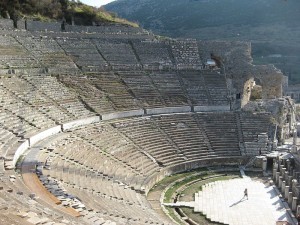 Government officials in Turkey recently approved a plan to preserve and reconstruct areas of the ancient and Biblical city of Ephesus.
Government officials in Turkey recently approved a plan to preserve and reconstruct areas of the ancient and Biblical city of Ephesus.
The Selcuk Municipality Assembly said that part of the plan includes the creation of new walking lanes and gates leading into the city, making the area more visitor-friendly for tourists. The city will be divided up into various zones: agriculture, commerce and tourism. Digs for historical artifacts will continue in Ephesus as well — a first degree archaeological site.
Ephesus is on the way to being included on the UNESCO (United Nations Educational, Scientific and Cultural Organization) World Heritage list, which is a desired position for cities that maintain and preserve the ancient heritages of the world.
According to Scripture, the Apostle Paul lived for a time in the city of Ephesus, and wrote to the Christians there to encourage them in the faith. His writings comprise what is known as the Book of Ephesians in the Bible.
During his time in the city, Paul, called Saul before his conversion, saw much paganism in the land. One of the main goddesses of the day was named Diana, who was both known as the moon goddess and the goddess of childbirth.
In outlining his visit to Ephesus in 57 A.D., Paul explained in Acts 19 that a silversmith named Demetrius and other metalworkers became angry at his preaching because his words turned many away from false gods, thus hurting the business of the metalworkers who crafted idols of Diana and sold them throughout the city.
“Sirs, ye know that by this craft we have our wealth,” Acts 19:25 outlines Demetrius as declaring to his fellow metalworkers. “Moreover ye see and hear, that not alone at Ephesus, but almost throughout all Asia, this Paul hath persuaded and turned away much people, saying that they be no gods which are made with hands, so that not only this our craft is in danger to be set at nought, but also that the temple of the great goddess Diana should be despised, and her magnificence should be destroyed, whom all Asia and the world worshipeth.”
The craftsmen and the city began chanting “Great is Diana of the Ephesians!” for two hours straight, rejecting the message of the Gospel for a time.
“They then seized two of Paul’s companions and a near riot followed during a meeting at the city theater,” explains the Museum of Unnatural Mystery. “Eventually, however, the city was quieted, the men released and Paul left for Macedonia.”
The theater mentioned in Scripture, now known as the Great Theater on Panayir Hill, still remains available for viewing to this day.
Additionally, one of the most popular artifacts in the city of Ephesus is the Temple of Artemis, the pagan goddess of fertility, who is also at times called Diana. Considered one of the Seven Wonders of the World, the remains of the temple still continue to be a sought out tourist site to date.
Become a Christian News Network Supporter...


